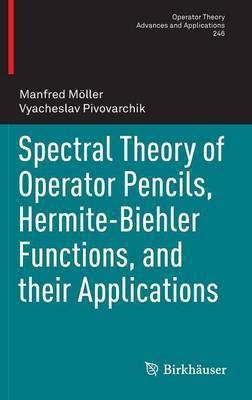Spectral Theory of Operator Pencils, Hermite-Biehler Functions, and their Applications(English, Hardcover, Moeller Manfred)
Quick Overview
Product Price Comparison
The theoretical part of this monograph examines the distribution of the spectrum of operator polynomials, focusing on quadratic operator polynomials with discrete spectra. The second part is devoted to applications. Standard spectral problems in Hilbert spaces are of the form A-?I for an operator A, and self-adjoint operators are of particular interest and importance, both theoretically and in terms of applications. A characteristic feature of self-adjoint operators is that their spectra are real, and many spectral problems in theoretical physics and engineering can be described by using them. However, a large class of problems, in particular vibration problems with boundary conditions depending on the spectral parameter, are represented by operator polynomials that are quadratic in the eigenvalue parameter and whose coefficients are self-adjoint operators. The spectra of such operator polynomials are in general no more real, but still exhibit certain patterns. The distribution of these spectra is the main focus of the present volume. For some classes of quadratic operator polynomials, inverse problems are also considered. The connection between the spectra of such quadratic operator polynomials and generalized Hermite-Biehler functions is discussed in detail. Many applications are thoroughly investigated, such as the Regge problem and damped vibrations of smooth strings, Stieltjes strings, beams, star graphs of strings and quantum graphs. Some chapters summarize advanced background material, which is supplemented with detailed proofs. With regard to the reader's background knowledge, only the basic properties of operators in Hilbert spaces and well-known results from complex analysis are assumed.


